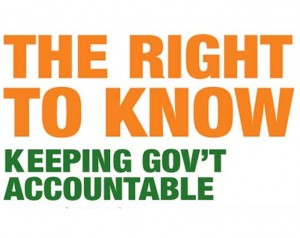Absence of right to information law said to be affecting journalists
 The absence of a right to information law has been found to be an obstacle to journalists and a threat to democracy in Ghana.
The absence of a right to information law has been found to be an obstacle to journalists and a threat to democracy in Ghana.
A fellowship of seven journalists investigating various issues relating to the application of public resources were met with evasive government officials who were not ready to provide from their archives, assembly minutes, bank statements of official accounts, records and other relevant documents.
The journalists, with financial support and extensive training from Ghana Right to Information Coalition (RTI Coalition) and Germany’s renowned international media development organisation, Deutsche Welle Akademie (DW Akademie) conducted their investigations in six weeks and each met with a dead end in their requests for official information.
Maxwell Suuk of Diamond FM investigated a non-operational health facility in Wulugu, West Mamprusi District constructed nine years ago, which is the source of many worries since the nearest health facility for the people is 30 km away.
Abdul-Hayi Moomen, a TV show host of Ghana Broadcasting Corporation (GBC), also went on a quest to ascertain why in the midst of funds, there is no bridge on the White Volta which claims more lives than malaria and AIDS in the Daboya community.
Laary Dasmani of Ghana News Agency, an expert on the subject of persons with disabilities, sought information on the disbursement of funds for persons with disabilities. His requests for official records and bank statements yielded no results.
The others are Laud Nartey of The Public Agenda who inquired about the use of road tolls from the relevant ministry; Chris Joe Quaicoe who asked for Peace FM, why funds for water, sanitation and hygiene were used to demolish illegal settlements; Rebekah Awuah of GBC who went after the almost-defunct National Symphony Orchestra and Kobby Gomez-Mensah who questioned the bad state of the road to Tarkwa.
All found difficulty in gaining access to official information. Beate Weides, coordinator of DW Akademie projects in Ghana says that journalists cannot work without official sources of information.
“They cannot report on the facts. They cannot inform the public and the public cannot make informed decisions. In short, the very basis of democracy in Ghana is under threat.”
Aarni Kuoppamäki, Project Manager of DW Akademie in Ghana, said issues of development become issues of right to information whenever there is a lack of official information for journalists to hold government accountable.
The right to information bill which is currently in parliament, is expected to give full effect to the right to information which is already enshrined in the 1992 Constitution.
Source: GNA
